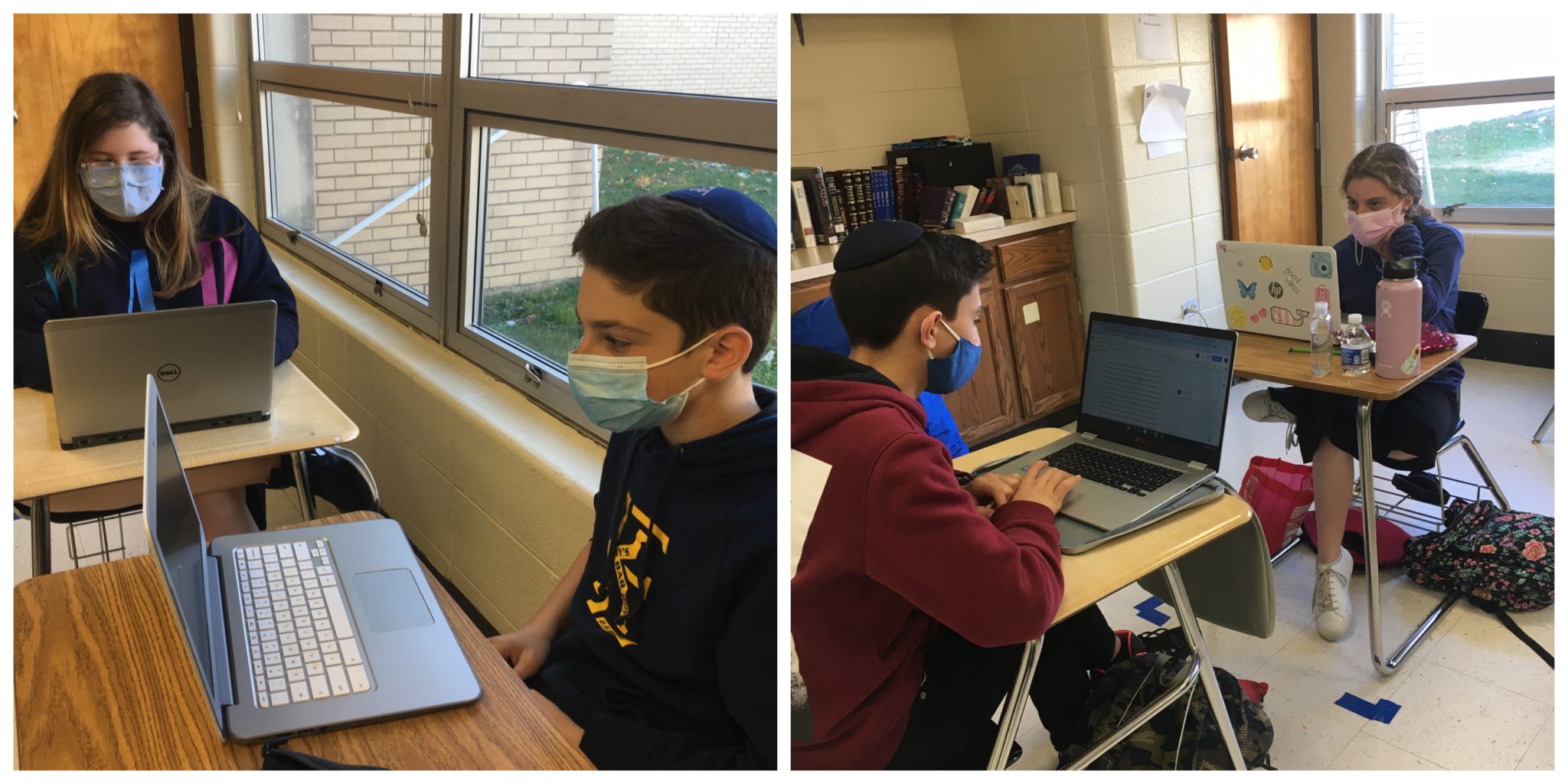Pedagogy of Partnership
post by Hillel Torah | Apr 22, 2021
Hillel Torah teachers love to learn and bring new ideas into the classroom, even during a global pandemic. Peek into the 7th grade Dinim class of Judaic Studies teacher Rabbi Yoni Gold, or Samantha Toljanic’s 8th grade ELA class, and you will see a new approach to the ideas and texts they study. Both teachers are bringing students and texts together this year using new tools from the Pedagogy of Partnership, or PoP. PoP, a national educational and professional development organization, provides an approach to studying rich content in partnership with peers, simultaneously cultivating sharp critical thinking and deep social-emotional capacities. PoP’s tagline is “How we learn is what we learn,” naming the fact that our students are not only learning content, but also the skills and attitudes of learning with and from each other.
Mrs. Toljanic and Rabbi Gold immersed in PoP over the summer, joining a cohort of teachers from the Chicago and Detroit areas in a fellowship program that includes ongoing coaching and training through the school year. The Pedagogy of Partnership (PoP) Midwest Fellowship for Chicago and Detroit area educators is funded by the Crown Family Philanthropies, The William Davidson Foundation, and the Mayberg Foundation and JEIC. Pivoting into an online format in response to the pandemic, PoP held a multiday online workshop to train faculty and create a learning community of K-12 Jewish educators.
In a time when students and teachers are navigating learning in person, online, or a dizzying combination of the two, PoP supports the nurturing of relationships between learners and the texts they study by developing the habits of wonder, empathy, and responsibility toward others and toward Torah.
What does this look like in the classroom? Whether online or in person, in pairs or as a whole class, students use “speech prompts” to help them develop the habit of listening deeply and helping each other to express their thinking: from “Can you say more about that?” to “I don’t think you are understanding me; let me explain,” and even “Attentive silence” – while keeping the text fully in the conversation.
Mrs. Toljanic’s 8th graders have used these tools in developing their writing skills in English Language Arts. As students wrote personal narratives, Mrs. Toljanic used PoP to transform the task of peer-editing. Pairs of students used their PoP listening and articulating skills to collaboratively peer-edit their classmates’ (anonymous) narratives, taking what can be a challenging task for middle schoolers into a new realm with the support of the speech prompts and their new understanding of the relationship between readers and text. Students used Google Docs to comment together, bridging the gap between classroom and remote learning. Most recently, Mrs. Toljanic has paired students to discuss their independently-read Holocaust novels. Mrs. Toljanic shares, “One of the most gratifying interactions to watch is when a more quiet student begins to realize the power using the PoP phrases gives them. They realize that their partner is using attentive silence giving them an open door to share their insights and ideas without interruption or judgement. This is a great moment!”
In Rabbi Gold’s Dinim class, his 7th grade students worked together asynchronously using the video app Flipgrid. Students analyzed key passages from the Gemara and Rambam exploring the role of the mitzvah of tefillin in positively influencing their decision making, and as an affirmation of their Jewish identity, helping them develop a greater awareness of G-d. Where in the past they might have read and analyzed the text on their own, this year students recorded themselves reading the text and shared that video with their chavruta (study partner). The partners then used their PoP skills to identify and reflect on textual details that their classmate’s reading and interpretation helped them to see in the text. Hearing and appreciating their partner’s interpretation helped students find new meaning in complex and important passages. One 7th grader reflected on the importance of learning with a partner and recognized, “when we learn with others who make us feel safe, then we can make mistakes and discuss our opinions and get closer to the truth.”
The work continues through the year in both classes as students move from “listening and articulating” to digging into the work of interpretation using new “wondering and focusing” skills. Utilizing PoP in the classroom has helped develop students’ skills and attitudes for more effectively collaborating, communicating and engaging in deep learning.

